- Home
- Lou Cameron
Stringer and the Hangman's Rodeo Page 4
Stringer and the Hangman's Rodeo Read online
Page 4
The prisoner thought some more and decided, “Well, it’s no big secret that I’m innocent. I’ve told everyone who’d listen that I was framed by that two-faced Joe LeFors. If they was pards of mine, fixing to rescue me, they’d be doing that about now, instead of trying to run newspapermen out of town for no sensible reason me and mine might have.”
“What if we’re talking about someone who wants to make sure you hang, Tom?” Stringer asked.
Horn laughed bitterly and replied, “Hell, they’d have no call to go after anyone else. Unless I can prove my innocence, Wyoming is fixing to hang me as high as anyone might want.”
Stringer frowned thoughtfully and said, “Try her this way. What if they thought I was out to prove you innocent?”
“I’d sure like that. How do you aim to start?” Horn said.
Stringer sighed and said, “No offense, but up until a mighty short while ago I was sure you were guilty. Run that part about Marshal LeFors framing you past me again, Tom.”
Horn explained. “Neither one of us was anywheres near the Iron Mountain range that time someone else gunned young Willie Nickell. The murder scene was scouted by the sheriff of Laramie County, as he had every right to scout it, being it was his jurisdiction. But they never found no sign connecting me nor anyone else to the killing.”
“Then how come a federal marshal arrested you for the crime, Tom?” asked Stringer.
“I wish I knowed for sure,” Horn replied. “Being federal, old Joe LeFors has jurisdiction just about anywhere he wants it. That’s how come he’s allowed to chase the Wild Bunch all he likes, way the hell over in the high country. Joe said, at my trial, that I boasted of the killing to him whilst I was in my cups.”
“Did you, Tom?”
“Lord have mercy, boy, when I’m drinking serious there’s just no telling what I might or might not say. For all I know, I might well have bragged I was Czar of all the Russians whilst he kept ordering more drinks for me. If I did say I knew beans about the death of Willie Nickells, I was bullshitting him ferocious, and he should have knowed better than to take me so serious. It ain’t as if we never got drunk together afore, you know. Me and Joe goes back a ways. I used to work for him as a part-time deputy.”
Stringer whistled softly and said, “Now that’s starting to sound interesting indeed, Tom. When did you work for Marshal LeFors and how come he fired you?”
“I disremember the exact year,” Horn replied. “It was the time we was after the Wild Bunch and, let’s see, I was the one as took Peg Leg Watson, single-handed. I was tracking out ahead and come on old Peg Leg, holed up alone in a mountain cabin. I reckon I was supposed to wait up for the rest of the posse, but it seemed sort of tedious, just setting there ahint a rock with my saddle gun trained on the fool cabin. So I commenced firing and, well, after swapping shots with me a spell, old Peg Leg saw it was no use and I was able to take him alive.”
Stringer whistled again and asked, “Did the posse you were scouting for take any other prisoners?”
“Nope,” Horn said. “All the others got away. Peg Leg would have, too, had not I been so far out ahead and, to be fair, him having been left ahint with his peg leg. How come we’re talking about Peg Leg Watson, son? I don’t see what it could have to do with Joe arresting me for killing Willie Nickell.”
“You may know more about tracking than you know about human nature, Tom,” Stringer told him. “Didn’t it ever occur to you that just by taking that outlaw alive, when your overly eager posse leader might have wanted the glory for his own might have put you in bad with LeFors?”
“I reckon he must have been sore at me about something when he arrested me. But I always thought a man wearing a deputy badge was supposed to go out and catch somebody for the law. Didn’t you?” Horn sighed.
Stringer frowned. “The world’s not as simple as you and I might like it to be, Tom. Did LeFors fire you for making him look less than heroic that time?”
“Nope. He said I’d done right on that job. He never exactly fired me. Like I said, I was working part-time, when they needed extra posse hands, and when I asked how come they never called on me no more, Joe said it was on account of my drinking habits.”
Stringer swore softly, then asked, “All right, let’s get that out of the way. Do you have a drinking problem, Tom?”
Horn sighed and answered, “Not while I’m locked up like this. Even when I’m running loose, I can go weeks at a time without getting in trouble with red-eye. But, yeah, once I do get to drinking I just can’t stop and, even worse, I have to allow I’m a sort of mean drunk.”
Stringer was about to ask whether the older man remembered what he might or might not have done during one of his drunken episodes. But then someone else was shouting, “What’s going on back here?” and as a flashlight beam swept his way Stringer was over the dashboard and rolling under the parked Panard.
It seemed he got to lay there for a million years, listening to the approaching boot heels as the big puddle of flashlight swept closer and closer. Finally, the man holding it stopped, close enough for Stringer to reach out and shine his boots, had he felt so inclined. But the copper badge had his light trained up on Tom Horn’s window now as he repeated, “What’s going on back here, Tom Horn? Who were you just talking to?”
Considering how slow the older man could seem about some things, he was quick-witted enough to reply, “I was just singing. I got tired of hearing that damned old harmonica across the way and decided to sing me some more interesting songs.”
Then, suiting action to his words, Tom Horn proceeded to sing, or croak, “I went down to the cellar, to get a jug of cider/ Where I spied two bedbugs, jerking off a spider/ Come and tie my pecker to a tree, to a tree/ Come and tie my pecker to a tree!”
The copper badge yelled, “Cut that out. You’re disgusting. Who owns this horseless carriage here?”
“Is there such a creation out there?” Horn replied. “Oh, yeah, I did hear funny noises out there a spell back. Thought someone was popping corn. What kind of a rig is it?”
The copper badge answered, “Never you mind. You ain’t about to go for a spin in it. I want you to cut that coyote yapping, too. Even if you didn’t sing so dirty, it’s getting late and other folks has a right to sleep. I wonder who owns this here rig.”
Tom Horn replied by singing, “Come and set by my side, little darling / Come and tell me how good you can screw.”
The law yelled, “Cut that out! I mean it!”
“What are you fixing to do if I don’t, hang me?”
So the copper badge yelled, “That does it!” and lit out to circle around to the front entrance, giving Stringer the chance to roll out from under the Panard and make tracks the other way.
He stopped running when he came to a side street lined with warehouses and few street lamps. He hoped the older man he’d been talking to would be able to talk himself out of a beating once he shut up, back there.
But as he made his way back to the neighborhood of his hotel Stringer reflected that his own chances didn’t look too bright right now. Unless he meant to hop a train out, he’d better pick up some more ammo before he ran into Friendly Frank again. But if the local copper badges caught him packing a loaded gun without a Wyoming permit, he’d be in almost as much trouble.
He stopped to build a smoke in a dark doorway as he muttered half aloud, “Damn it, Boss, you told me covering this wild west show in Cheyenne would be a snap, not the real thing!”
Stringer gulped when he saw who’d opened the door he’d just knocked on, expecting a man to open up for him. The shapely ash blonde standing there with her hair unpinned for the night must not have known the lamp light behind her was shining through her thin beige kimono so brightly. She just stared up at him with a curious smile. He gulped again and said, “Uh, they told me at my hotel that I’d find the nearest good lawyer, here, ma’am. I know it’s late, but would lawyer Morrison, Pat Morrison, be here?”
She replied, “That’s
me. The first name is Patricia and these are hardly my business hours. But if it’s important…”
“You might call it a matter of life and death, ma’am,” Stringer said. She told him to come on in.
He couldn’t see through her kimono once they were on the far side of the floor lamp near the door. But it was still sort of thin and he had to admire the way she walked ahead of him, even though such matters were the last thing for a man to have on his mind right now. She led him out of the little waiting room she had set up, and when they wound up in a smaller office with yet another electrified lamp over a big old desk, she waved him to a leather chair on one side and sat down on the other. She slid open a drawer and got out a pad of yellow ruled paper. Then she picked up a yellow pencil and said, “We usually start with a client’s name.”
So Stringer told her who he was and that the San Francisco Sun would be paying if she billed them sensible. She said she charged five dollars a visit and a dollar an hour in court. Sounded reasonable, he said, so they got down to cases.
From time to time she cut in to clear up a point in his story and he noticed she wrote down only names, times, and places. As he brought her up to date on his recent misadventures Stringer found it sounded sort of wild to him as well. But she never even raised an eyebrow while she heard him out. It made him feel better about her. At second glance, she seemed older and more experienced than he’d taken her for at first sight. He figured her for about thirty-odd, and the framed diplomas hanging on her wall above her blond head allowed she’d been to all sorts of law schools. It wouldn’t have been polite to ask why in thunder a woman wanted to be a lawyer. He knew what she was doing in Wyoming. Folk with professional skills were harder to find in cow country, and Wyoming men admired any kind of female so much that they were talking about giving women the vote. A man had to take such political bull with a grain of salt, of course. But it seemed if any states at all ever let the poor sweet things vote, Wyoming would be one of the first.
He was dying for a smoke but knew better than to light up without a lady’s permit. So he began to like her even more when they were getting near the end and she took out a pack of tailor-made cigarettes. It was a good thing she smoked them in a long ivory holder. It gave Stringer time to come unstuck and reach across the desk to light her up.
She thanked him and leaned back in her own chair, inhaling thoughtfully as he got down to the part about asking at the hotel about lawyers. He said, “That’s about all I know, and does Bull Durham tobacco offend you, ma’am?”
“Oh, I’m sorry,” she said quickly, sitting up. “I’ve been so interested in your story that I fear I forgot my manners.” Then she slid the pack of tailor-mades his way. He had to be polite, too, so he took one out and gingerly lit it. It wasn’t bad. Just a mite weak. He told her he’d seen the brand advertised on many a barn and that he admired Miss Fatima, whoever she was, for making such nice smokes.
Lawyer Morrison said, “Let’s get back to more pressing problems, Mister MacKail. Since my first duty to a client is to give the advice that would probably cost the least bother and expense, there is that midnight train to consider, you know.”
Stringer shook his head and said adamantly, “I didn’t need a lawyer to tell me leaving town was safe and sure. I’m not trying to be a hero or prove my manhood, either. I’ve walked out of many a bar fight in my time, and so far, no hair’s fallen out of my fool chest. I can’t leave because I have a job to do here in Cheyenne. It’s as simple as that.”
She nodded, blew a thoughtful smoke ring, and said, “You have as much right to attend the rodeo as anyone else I can think of, and it’s not as if we’re talking about a secret rite. They’re expecting a crowd of several thousand.”
“I don’t think they could be worried about me reporting a calf for cheating in the roping contests, ma’am. They seem to fear I’m interested in raking up that killing Tom Horn was convicted for.”
“Convicted and appealed, you mean,” she sighed. “I’m not too familiar with the case. But naturally, practicing law here in Cheyenne, one hears things around the courthouse. Are you planning to write some sort of exposé about the Nickell killing, Mister MacKail?”
He shook his head. “I don’t know a thing about it that hasn’t been presented in open court. But, of course, the gents who sent that gunslick after me might not know that.”
She made a note, then looked him straight in the eye. “It’s obvious they were afraid you were interested in something more important than a calf roping contest.” She hesitated a moment. “Let me see if I can’t word it another way. As I read it, your life has been threatened, you can’t get the local law to take the threat seriously, and you still want to stay here over the weekend. I was married to your breed of man one time. He died in the war with Spain. I couldn’t get him to listen to me, either.”
She grimaced and added, “Yellowjack. He said he had a job to do. He died without ever getting to the front.”
Stringer nodded soberly and said, “I did. He didn’t miss much. We lost maybe three or four hundred men in the fighting and over a thousand to Yellowjack. I wrote about that. Nobody wanted to print it. I’m sorry about your man, ma’am. But I still need a gun permit.”
She blinked and asked, “Is that why you came to me tonight? I thought you were seeking sensible legal advice.”
“I knew right after I talked to Friendly Frank that the most sensible thing to do would involve that midnight train. But I was sent here to write a news feature and so I need a Wyoming gun permit if I’m to stay alive until your Frontier Days wind down.”
She sighed and, “I told you I’d met your breed of man before. I can probably get a judge I’m on good terms with to issue you a special permit and a restraining order if you feel the police are going out of their way to annoy you.”
“I’d like that,” he said, nodding. “I could have just run into a natural pain. We had sergeants like that in the army. But it did cross my mind he was being mighty picky about guns at a time when shoe clerks and even some gals seem allowed to be packing ‘em, no offense. How early in the morning does this judge of yours open for business?”
She frowned thoughtfully. “Judge Kenton isn’t mine or anyone else’s. That’s why he’s the man we want to take your problem too. He’s usually in his chambers at the courthouse by nine. But I just remembered he’s agreed to act as one of the judges at the rodeo. Hmmm, that could be a problem. We don’t want you chasing all over town with that empty gun and he’s going to want to see you personally before he issues you any permits.”
“They won’t be starting the show at the fair grounds until around noon, if that early,” Stringer said.
“Judge Kenton will surely want to get there well before the general public is admitted. Could you get us on the grounds before the gates open?”
Stringer nodded. “Sure. I have a press pass, and even better, I know some of the contestants.”
She rose from behind her desk, apparently unaware of how open the top of her kimono was. “All right,” she said, “let’s say we hit the fair grounds less than an hour before the show starts. That ought to throw anyone who’s hunting you off stride. I’ll naturally have the legal forms filled out for Judge Kenton to approve and sign. Then you’ll be free to cover the show as you intended, loaded gun and all.”
“I’ll still need bullets,” he said, frowning. He thought for a moment. “Hold on, I know a friendly gal with the show who collects guns. I’m sure she’ll sell me a box of .38s if I ask polite.”
“I thought you just told me you had no friends to turn to in this town.”
“I don’t have, smart as you. Rimfire Rowena is just a sort of good old boy who happens to be a woman. I don’t know her well enough to ask for bullets free, if that’s what you’re interested in.”
The lady lawyer raised one cool ash blond eyebrow, then shrugged. “I don’t consider the private life of anyone named Rimfire Rowena any business of mine. Once I get you your gun permit, yo
u’re free to ask your little cowgirl for bullets or anything else she may have to offer.”
“Bueno. What time in the morning do you want me back here to go see that judge?” he asked.
She hesitated. “At the rate you’re going, you’re more likely to wind up with an interesting obituary than a newspaper scoop. Hasn’t it occurred to you that if they sent a man to threaten you at your hotel, they just might know where it is?”
“I hadn’t gotten around to where I was planning to spend the rest of the night,” he replied. “You’re right. I’d better leave my possibles at the Drover’s Palace to defend themselves as best they can and scout me up another hotel.”
“That’s assuming you last long enough to find shelter with an empty gun, what with the crowds thinning away on the dark streets outside—even as we talk about the odds.”
“You sure know how to cheer a man who has to walk home in the dark,” he said, smiling thinly. “But I don’t see how even the Wild Bunch entire could have every street corner in a town this size covered.”
“How do you know you weren’t followed here from your hotel?” she asked.
“Yeah,” Stringer laughed. “You’re a regular eternal optimist. I don’t suppose you’d have a back door to this layout?”
She beckoned him to follow as she led the way through the side door of her office. Her private quarters were dark. They made it through another doorway and then she switched on one of those fancy Tiffany lamps .He’d expected to wind up in somewhere along the lines of a kitchen, since that was where most folk kept their back doors. But they seemed to be in a bedroom. A lady’s magazine lay face down, open, atop rumpled satin sheets, showing what she’d been up to when he came pounding on her front door.

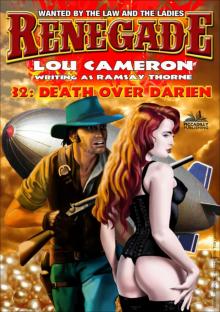 Renegade 32
Renegade 32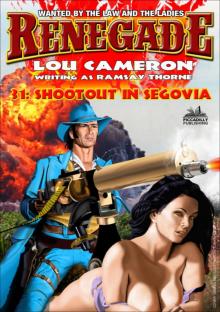 Renegade 31
Renegade 31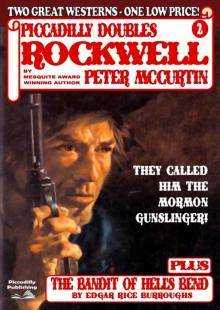 Piccadilly Doubles 2
Piccadilly Doubles 2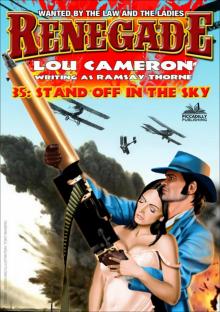 Renegade 35
Renegade 35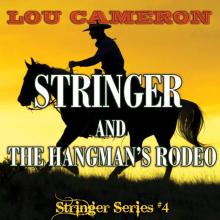 Stringer and the Hangman's Rodeo
Stringer and the Hangman's Rodeo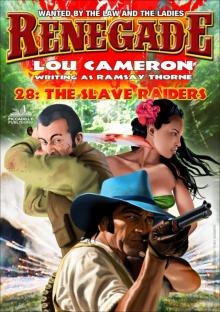 Renegade 28
Renegade 28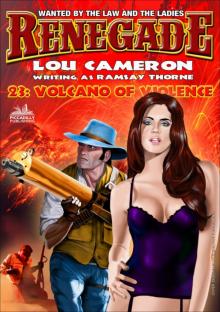 Renegade 23
Renegade 23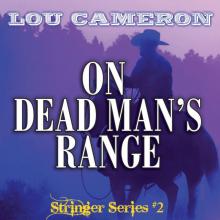 On Dead Man's Range
On Dead Man's Range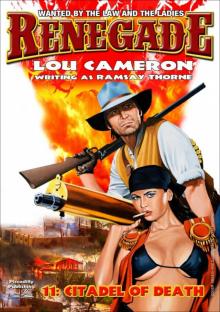 Citadel of Death (A Captain Gringo Western Book 11)
Citadel of Death (A Captain Gringo Western Book 11)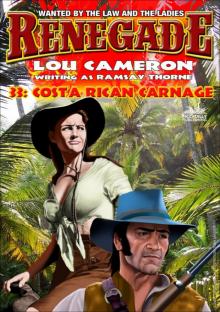 Renegade 33
Renegade 33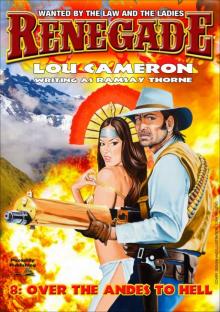 Over the Andes to Hell (A Captain Gringo Western Book 8)
Over the Andes to Hell (A Captain Gringo Western Book 8)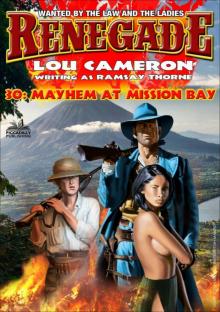 Renegade 30
Renegade 30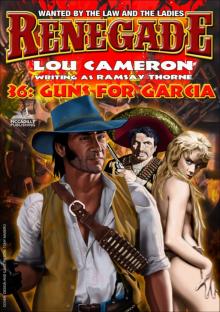 Renegade 36
Renegade 36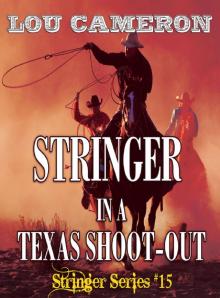 Stringer in a Texas Shoot-Out
Stringer in a Texas Shoot-Out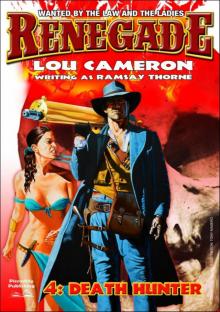 The Death Hunter
The Death Hunter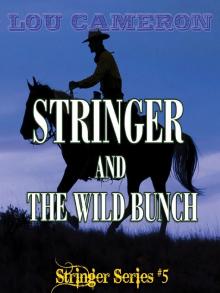 Stringer and the Wild Bunch
Stringer and the Wild Bunch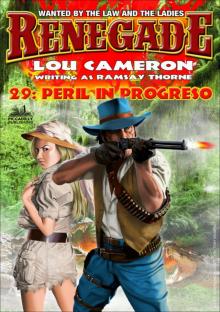 Renegade 29
Renegade 29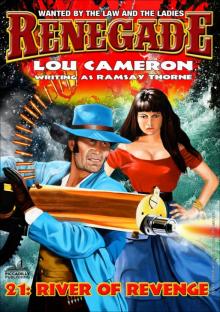 Renegade 21
Renegade 21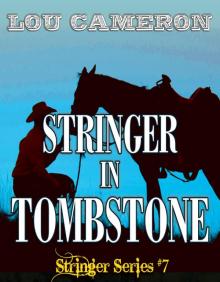 Stringer in Tombstone
Stringer in Tombstone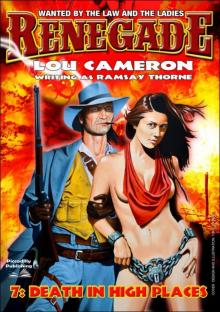 Death in High Places (A Renegade Western Book 7)
Death in High Places (A Renegade Western Book 7)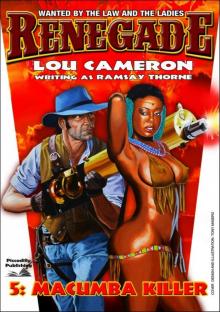 Macumba Killer
Macumba Killer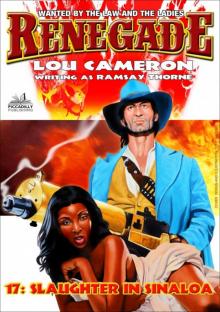 Renegade 17
Renegade 17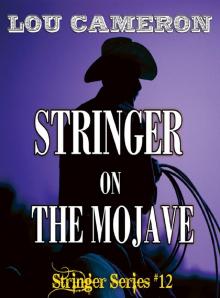 Stringer on the Mojave
Stringer on the Mojave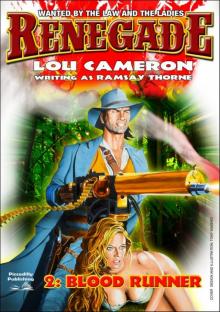 Blood Runner
Blood Runner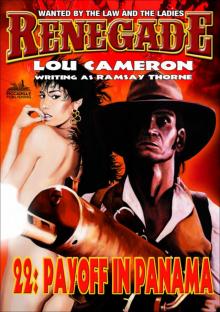 Renegade 22
Renegade 22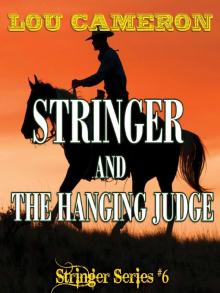 Stringer and the Hanging Judge
Stringer and the Hanging Judge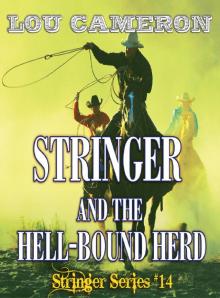 Stringer and the Hell-Bound Herd
Stringer and the Hell-Bound Herd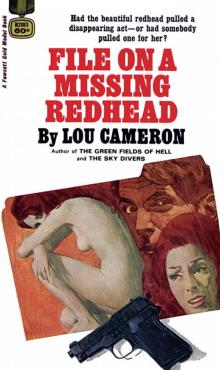 File on a Missing Redhead
File on a Missing Redhead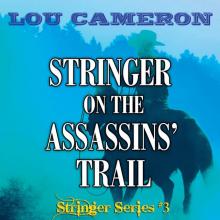 Stringer on the Assassins' Trail
Stringer on the Assassins' Trail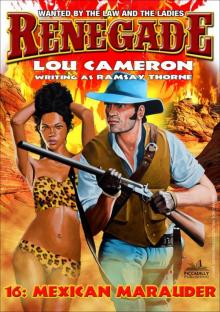 Mexican Marauder (A Captain Gringo Adventure #16)
Mexican Marauder (A Captain Gringo Adventure #16)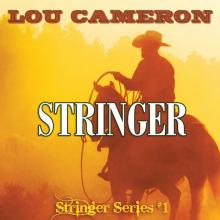 Stringer
Stringer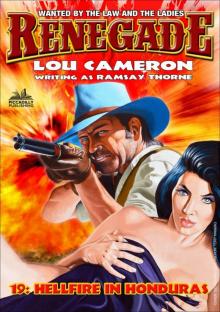 Renegade 19
Renegade 19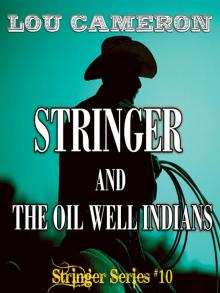 Stringer and the Oil Well Indians
Stringer and the Oil Well Indians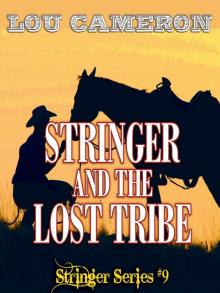 Stringer and the Lost Tribe
Stringer and the Lost Tribe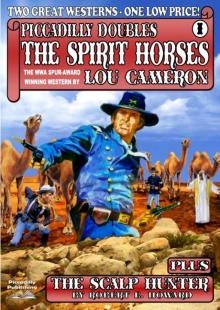 Piccadilly Doubles 1
Piccadilly Doubles 1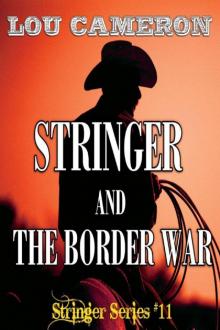 Stringer and the Border War
Stringer and the Border War Renegade
Renegade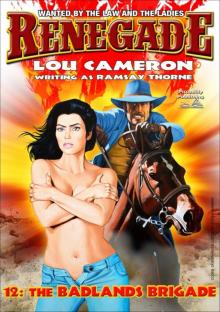 The Badlands Brigade (A Captain Gringo Adventure Book 12)
The Badlands Brigade (A Captain Gringo Adventure Book 12)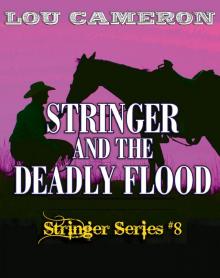 Stringer and the Deadly Flood
Stringer and the Deadly Flood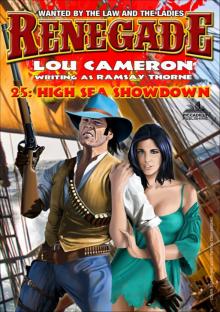 Renegade 25
Renegade 25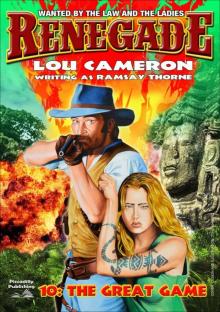 The Great Game (A Captain Gringo Western Book 10)
The Great Game (A Captain Gringo Western Book 10)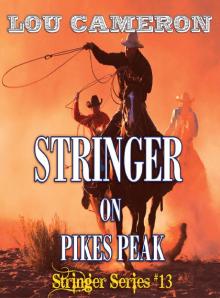 Stringer on Pikes Peak
Stringer on Pikes Peak